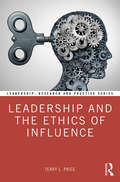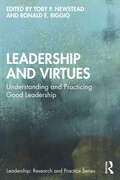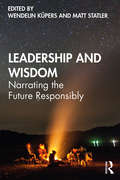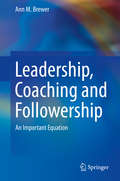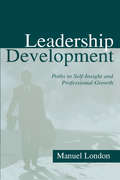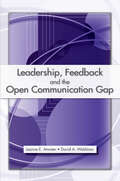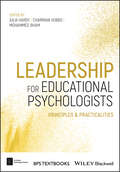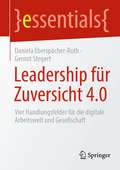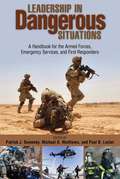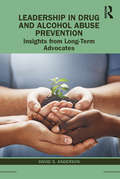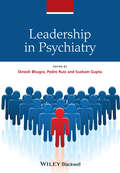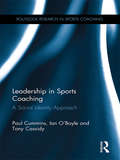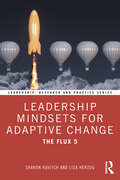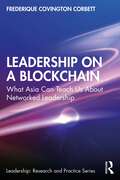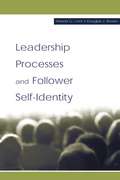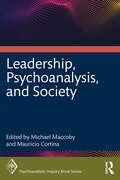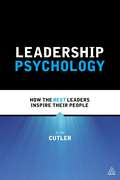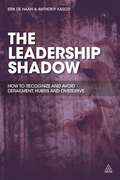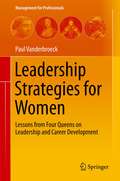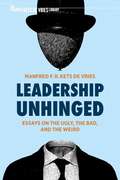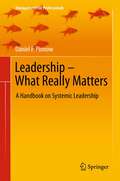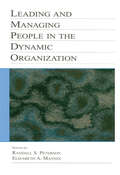- Table View
- List View
Leadership and the Ethics of Influence (Leadership: Research and Practice)
by Terry L. PriceHow do leaders influence others? Although they sometimes appeal directly to good reasons, which we associate with rational persuasion, leaders also use guilt, pressure, flattery, bullying, and rewards and punishment—all to get the behaviors that they want. Even when leaders refrain from outright lying, they are nevertheless known to practice something approaching, perhaps reaching, the level of manipulation. Influence therefore presents a serious ethical problem across leadership contexts. Leadership and the Ethics of Influence argues that influence puts leaders at risk of using people. It is generally disrespectful of autonomy to figure out what makes people "tick" in an effort to "handle" them. In contrast with physical force, influence works through agency, not around it. Despite this feature of influence—and, to a large extent because of it—the everyday influence associated with leadership is often morally troublesome. What matters morally is not only whether agency is bypassed or overridden but also who is ultimately in control. This book uses philosophy and leadership studies to show how leaders across different contexts can be justified in getting followers to do things. Connecting moral theory to leadership theory, and especially to charismatic leadership, authentic leadership, transforming leadership, and ethical leadership, this book is essential reading for leadership scholars, students, and practitioners.
Leadership and Virtues: Understanding and Practicing Good Leadership (Leadership: Research and Practice)
by Ronald E. RiggioGood leadership is something every leader and organization should strive towards. This book serves as a pivotal resource in encouraging the understanding and practice of leadership and highlights how good leadership is anchored in the rich philosophy and science of virtue. Through a diverse range of perspectives, the book highlights the importance of leading with virtue, unpacks what it means to be a virtuous leader, and outlines practical strategies for developing and practicing good leadership. Taking a virtues perspective, this cohesive collection of chapters by scholars from around the globe offers an inclusive tone and speaks to practicing and aspiring leaders worldwide. Readers are provided with a nuanced account of the nature of virtues and leadership and how the two interact on multiple levels and in multiple ways to inform the practice of good leadership. Focusing on the tradition of virtue gives this collection a robust scholarly foundation, while simultaneously providing scope for diverse views on how and why virtues inform good leadership. The book offers a balance of scholarly and practice-oriented chapters, instilling readers with a deep understanding of virtues and leadership, and practical strategies to develop their practice of good and virtuous leadership. Each chapter offers a different moral and sociological insight, serving altogether to show readers the most effective ways to use virtues to promote shared well-being and collective success. Scholars, students of leadership and management, and leadership practitioners will benefit from the accessible and practical lessons this book has to offer. This volume will also be of interest to team leaders and managers who are keen to develop their leadership skills in both practice and theory.
Leadership and Wisdom: Narrating the Future Responsibly
by Wendelin Küpers Matt StatlerLeadership and Wisdom: Narrating the Future Responsibly gives business students and practitioners the opportunity to re-read tales, poems, myths and fables that have been interpreted by leading management scholars in order to translate the world’s folk wisdom into insightful and actionable lessons for a more responsible leadership practice. Most, if not all, cultures generate narratives that teach people how to make sense of the world and how to respond to challenges with wisdom. These sources provide a medium for character, as well as a guide for decision-making in ambiguous and uncertain circumstances. Management and organization scholars increasingly focus on what narrative wisdom traditions can teach us about leadership and organizational practices, and this book is designed to bring it to students and practitioners. Statler and Küpers have assembled a world-class team of contributors, who reflect on narratives near and dear to them, and draw out the lessons for leaders. With consistency throughout and end-of-chapter questions, this book enables all readers – including undergraduate and postgraduate students of leadership, management and organization studies, as well as interested researchers and practitioners – to reflect on the contents and implications of folk wisdom.
Leadership at a Distance: Research in Technologically-Supported Work
by Suzanne P. WeisbandThis volume offers insights from a noted group of scholars who discuss the complex phenomenon of leadership in distributed work settings - also known as leadership at a distance. Editor Suzanne Weisband addresses the ubiquitous roles leaders play, their scale of work, and the range of technologies available to them, while setting new directions in
Leadership at the Spiritual Edge: Emerging and Non-Western Concepts of Leadership and Spirituality
by Mohammed Raei Stacey K. Guenther Lisa A. BerkleyThis insightful book explores the intersection of spirituality and leadership, examining cutting edge research, theory, and practices that help build healthy and long‑term effective leadership. Showcasing non‑Western views of leadership across a range of backgrounds, the book looks at leadership styles that raise and expand consciousness to enable better problem solving when addressing the complex challenges of organizations and societies.Across four sections, the book considers a myriad of themes from surrender to compassion, the dark and shadow side to the illuminating light of love, as well as offering a spotlight on individual leader development to highlight the role of the collective. Each chapter individually and collectively represents the essence of a profound shift in how leadership is approached in the 21st century. The volume offers a variety of viewpoints addressing this spiritual turn in leadership scholarship, and provides leadership tools to assist leaders in honing their practices to address contemporary challenges and unleash their full potential.In a world where the challenges are immense and multifaceted, this anthology explores leadership that transcends the mundane and ventures into the extraordinary. Leadership at the Spiritual Edge will be of use to researchers, scholars, and students of leadership studies, particularly those interested in new ways of viewing and developing leadership.
Leadership, Coaching and Followership
by Ann M. BrewerThis volume presents evidence-based ideas on all three converging forces to suit an array of individuals and their organisations. The volume is thick with evidence, detail and case studies that the reader can draw upon and apply to their own situations. Defining exactly what is leadership has been a persistent problem for researchers and theorists. Discovering how to create or produce leaders likewise has been a difficult challenge over the years. Written by an academic, executive and coach, the author focuses on three important converging aspects: leadership, followership and coaching. Focus on leaders is disproportionate to what actually occurs within most organisations especially the relationship between the leader and the followers. That leadership is tantamount with being in control of a situation is challenged, together with the belief that leadership capability is primarily shaped in line with a set of success criteria. The coach plays a significant part in this process although rarely visible.
Leadership Development: Paths To Self-insight and Professional Growth (Applied Psychology Series)
by Manuel LondonLeadership Development explores how leaders gain and use self-knowledge for continuous improvement and career development and describes how leaders help themselves and the people with whom they work, understand themselves, and become more self-determined, continuous learners, and make the most of resources, such as feedback and coaching. This book explains why leaders need support for self-insight and professional growth in today's business environment. It explores dimensions of effective leadership in light of business, technological, and economic trends. Focusing on the importance of leaders developing accurate self-understanding, the book defines self-insight, outlines the meaning of internal strength and resilience for self-regulation, and considers how leaders attain a meaningful and realistic sense of self-identity. This volume illustrates ways organizations support these psychological processes. Leadership development is viewed as a comprehensive, continuous process that includes evaluating organizational needs and individual competencies, setting goals for career development and performance improvement, offering needed training and growth experiences, providing feedback, and tracking change in behavior and performance over time. It describes how leaders react to feedback and how 360-degree feedback survey methods and executive coaching help leaders attain and apply self-insight to enhance their performance. In addition, this book considers challenges and opportunities for leadership development, including how leaders overcome career barriers and become continuous learners.
Leadership, Feedback and the Open Communication Gap
by David A. Waldman Leanne E. AtwaterThe topic of leadership has grown in importance, and how and when managers communicate is critical to their effectiveness. This book provides insight for managers to understand the feedback and open communication processes. It suggests guidelines for how and when managers should engage in negative feedback and open organizational-level co
Leadership for Educational Psychologists: Principles and Practicalities (BPS Textbooks in Psychology #107)
by Julia Hardy Mohammed Bham Charmian HobbsWritten by and for educational psychologists, this valuable text includes reflections and practical support that will equip professionals to confidently handle the challenges inherent to leadership in the field for decades to come. The book: Meets a need to support new and existing educational psychologists (EPs) in understanding a range of leadership models Provides useful frameworks to apply to the Local Authority contexts where leaders are working Offers chapters that can be read independently as stand-alone topics or in sequential order Is derived from decades of courses for leaders of educational psychology Written by experienced educational psychologists (EPs) for other EPs in leadership positions and those aspiring to become leaders, this unique and practical book addresses a number of themes including the debate over the nature of leadership and the growing concern for equity and ethics in practice. It emphasises the importance of building and maintaining relationships at all levels, especially during challenging times. Leadership for Educational Psychologists: Principles & Practicalities offers chapters covering such topics as: managing educational psychology services (EPSs); past and present leadership frameworks; ethical leadership; change management; women in leadership; inspirational and outward-facing leadership; educational psychology within a Welsh context; appreciative enquiry; recruitment and retention; managing data and quality standards; selling educational psychology services; and more. The book finishes with a section on available support mechanisms for EPs in leadership positions. Leadership for Educational Psychologists will be of great benefit to educational psychologists in leadership, including existing principal and senior educational psychologists, as well as those planning to move into promoted posts within EPSs. It will also be of interest to policymakers in local government, public sector leaders who manage professionals within local authorities, and voluntary and community organisations.
Leadership for Older Adults: Aging With Purpose And Passion
by Sandra A. Cusack Wendy J. ThompsonThis study tells the tale of two retirement organizations that reflect common leadership issues throughout the western world, issues that are emerging in many developing countries and have yet to be experienced in others. Wherever rapid population ageing is coupled with a view of old people as useless and a burden, challenging questions arise: how do we develop the resources and leadership potential of our ageing population? How do we turn old age from an expensive wasteland into a fertile period of growth and development?
Leadership für Zuversicht 4.0: Vier Handlungsfelder für die digitale Arbeitswelt und Gesellschaft (essentials)
by Daniela Eberspächer-Roth Gernot StegertDigitale Transformation ist eine der größten Herausforderungen für Organisationen, Unternehmen und demokratische Gesellschaften. Das Autorenduo greift die Gefahren konstruktiv auf, betont die Chancen und entwickelt von einem positiven Menschenbild aus evolutionär Empfehlungen für Zuversicht in einer digitalen Welt. Praktische Leadership-Elemente in vier aufeinander aufbauenden Handlungsfeldern verhelfen darüber hinaus zu einem positiven Umgang mit digitaler Technik.
Leadership in Dangerous Situations
by Michael D. Matthews Patrick Sweeney Paul B. LesterLeadership in Dangerous Situations provides in-depth coverage of the key psychological, social and organization factors that impact individual and organizational effectiveness for First Responders in dangerous environments. Leading scholars discuss how current theories and empirical research provides guidelines to help solve the challenges leaders are likely to face in dangerous contexts. This book is directed to First Responders leaders from the Military, Law Enforcement, Fire, Emergency Services and Not-for profit agencies working in dangerous areas. The purpose of this book is to assist the First Responders who risk their lives to serve the public, to prepare for the unique challenges of leading and operating in dangerous situations. Dangerous situations are environments where group members must routinely engage in events that place their physical and psychological well-being at risk to accomplish the organization's objectives. International scholars and practitioners from the military, law enforcement, fire and rescue, teamed together to address the unique challenges facing dangerous context leaders. Each chapter integrates theory and research with practical experience to address the various challenges these leaders will face while operating in dangerous situations. The intent is to provide practitioners an easily understandable guide, backed by scholarly findings, to prepare themselves and their organizations for the unique psychological, social, and physical challenges of leading and operating in dangerous contexts. The blending of theory and empirical research with practical experience clearly illustrates the principles of effective leadership in dangerous contexts Whether one is a young leader preparing for war, a seasoned commander with multiple combat tours, a Special Weapons and Tactics (SWAT) team leader, Emergency Medical Technician (EMT) supervisor, first line supervisor of a law enforcement patrol unit, or a lieutenant responsible for a shift of firemen, the challenges of leading people in contexts where life and death decisions are common are very similar. The purpose here is to provide the leader with a better understanding of what is required to lead in dangerous contexts. The contributing authors delve into the psychological, social, and physical factors that can impact the ability to lead, the ability of personnel to perform, and the organization's ability to accomplish the mission. In the end, the leader will take away not only a understanding of how leading in dangerous contexts is different than leading in contexts where lives are not on the line, but also gain a deeper understanding of why it differs, where commonalities occur, and - perhaps more importantly - how to prepare leaders, whether military or civilian to guide their first responder organizations to perform successfully in dangerous situations.
Leadership in Drug and Alcohol Abuse Prevention: Insights from Long-Term Advocates
by David S. AndersonLeadership in Drug and Alcohol Abuse Prevention blends the wisdom of numerous long-term professionals addressing drug and alcohol issues with helpful strategies and current science. Organized around the Pyramid of Success that emphasizes Competence, Confidence, and Commitment, this book offers practical and grounded approaches for better addressing substance abuse issues. Included are insights from 50 contributors, featuring professional perspectives from practitioners with decades of experience. While issues of substance abuse are not readily solved or cured, they can be better addressed – more effectively, more efficiently, and more appropriately. This timely resource offers a unique blend of science-based strategies and resourceful foundations for implementation. Designed for those working either directly or indirectly with problems associated with substance use disorders, this book will aid those in a wide variety of settings, whether in schools, communities, business, or government.
Leadership in Psychiatry
by Susham Gupta Dinesh Bhugra Pedro RuizThe psychiatric profession must ensure that its next generation of leaders has the appropriate skills to provide mental health services in the face of globalization and urbanization, new technologies, and competing demands for shrinking resources. Developing leadership skills and leaders is critical in order to optimise the use of resources, their application, service planning and delivery of services for patients and their families.This is the first book on leadership (rather than management skills) to focus on psychiatry and mental health care. Contributions from international experts with clinical and non-clinical backgrounds pull together the theories and practical skills required to be a successful leader. The aim is to guide mental health professionals in general and psychiatrists in particular on how to gain the relevant skills and on how to utilise these skills and training to take on leadership roles in clinical and organisational settings.The book covers the role of the leader and the skills required for leadership, including chapters on communication, decision-making, team development, mentoring, gender issues in leadership, burnout and more. It includes a section on assessment tools and learning material. Essential reading for all those who aspire to lead in psychiatry!
Leadership in Sports Coaching: A Social Identity Approach (Routledge Research in Sports Coaching)
by Paul Cummins Ian O'Boyle Tony CassidyThe professionalisation of sports coaching has demanded higher standards of leadership in order to improve performance and effectiveness. This book focuses on leadership in sports coaching, exploring key concepts and principles underpinned by a presentation of new empirical research. Placing social identity theory at its centre – a theory not previously applied to sports coaching – this book provides students and researchers with a powerful tool for understanding the complex social dynamic that is the coaching process. Its chapters cover all the central aspects of sports coaching, including leadership style, measuring effectiveness, motivation, confidence and team self-esteem. Chapters explore different coaching environments to investigate the extent to which social identity impacts on coaching and leadership. A ground-breaking contribution to this field of research, this book demonstrates the significance of social identity theory in sport for athletes, coaches and leaders. Leadership in Sports Coaching: A social identity approach is an illuminating read for any student or researcher with an interest in coaching theory, coaching practice, sport psychology, sport leadership or sport management.
Leadership Mindsets for Adaptive Change: The Flux 5 (Leadership: Research and Practice)
by Sharon Ravitch Liza HerzogThis informative and practical book helps leaders develop adaptive leadership mindsets and skills to address the myriad intersecting challenges shaping today’s workplace. Through the Flux 5 framework, organizational culture and systems experts Sharon Ravitch and Liza Herzog help leaders, teams, and organizations create the organizational conditions to drive and enact adaptive change. At a time of unprecedented workplace flux, leader roles are constantly being redefined, requiring more finely attuned leader mindsets, frames for leadership, and skillsets for moving the dial on individual and organizational sense-making for cultural and institutional excellence. Based on five mindsets – Inquiry Mindset, Humanizing Mindset, Systems Mindset, Entrepreneurial Mindset, and Equity Mindset – the Flux 5 framework teaches leaders to drive adaptive change as a tool of professional and organizational development. Using embedded leader learning activations and organizational practices, the book guides leaders to develop each mindset as they read. The book encourages leaders (and their organizations in diffusion effect) to cultivate a visionary and resonant leadership approach at the intersection of crisis leadership, professional and human development, systems thinking, entrepreneurial leadership, and organizational equity frameworks. Succinct, accessible, pragmatic, and inspiring, this useful guide will grab the interest of leaders, teams, and organizations across sectors, organizational types, and business contexts, and engage professors, students, and practitioners of leadership, management, organizational psychology, and organizational development.
Leadership on a Blockchain: What Asia Can Teach Us About Networked Leadership (Leadership: Research and Practice)
by Frederique Covington CorbettLeadership on a Blockchain: What Asia Can Teach Us About Networked Leadership is an authoritative text that goes to the foremost digitally connected markets of the world in Asia, and accounts for how leaders and teams are exercising leadership Darwinism to adapt for agility and connectivity. The book begins by offering a contextual grounding for new leadership ideas to emerge. It contends that a "new geography of leadership" is unfolding as the world shifts away from unified globalist ideology and a dominant Western view of leadership. It moves on to describe how Asia is uniquely placed to become the leadership sandbox for the future. It accounts for how leaders and teams are exercising leadership Darwinism to adapt for agility and connectivity. To facilitate learning for the readers, this book includes creatives features such as the following: An abbreviated history of significant leadership milestones in the last century A leadership manifesto for the digital age A practitioners’ starter kit to reimagining leadership in their organizations. Leaving behind the typical discourse of leadership anchored in power, control, and hierarchy, it offers a provocative call to all businesspeople to apply the principles of one of the most innovative technologies – blockchain – to reimagine leadership for transparency, trust, and distributed decision-making. The book concludes by distilling critical lessons for global leaders to take forward and lead a revolution in their own organizations. Sharing first-person accounts from leaders and their teams in China, Singapore, India, and Indonesia, and combining this with insights from the author’s own research, Leadership on a Blockchain will be of use to leaders around the world looking to transform their own leadership. It will also be of interest to academics and students of leadership, change management, organizational behavior, and cultural studies.
Leadership Processes and Follower Self-identity (Organization and Management Series)
by Robert G. Lord Douglas J. BrownPresenting a follower-centered perspective on leadership, this book focuses on followers as the direct determinant of leadership effects because it is generally through follower reactions and behaviors that leadership attempts succeed or fail. Therefore, leadership theory needs to be articulated with a theory of how followers create meaning from leadership acts and how this meaning helps followers self-regulate in specific contexts. In this book, an attempt is made to develop such a theory, maintaining that the central construct in this process is the self-identity of followers. In developing this theoretical perspective, the authors draw heavily from several areas of research and theory. The most critical constructs do not come directly from the leadership literature, but from social and cognitive theory pertaining to follower's self-identity, self-regulatory processes, motivation, values, cognitions, and emotions and perceptions of social justice. Leaders may have profound effects on these aspects of followers and it is by analyzing such indirect, follower-mediated leadership effects that most ideas regarding leadership theory and practice are developed. Due to its broad theoretical focus, this book is relevant to a number of audiences. The authors' principal concern is with the development of leadership theory and the practice of leadership making the book relevant to audiences in management, applied psychology, and social psychology. They have tried to clearly define key constructs and provide practical examples so that the book could be accessible to advanced undergraduate students. However, the diversity of the underlying theoretical literatures and the complexity of the framework developed also make the book appropriate for graduate courses in those disciplines, and for readers with a professional interest in leadership theory or practice.
Leadership, Psychoanalysis, and Society (Psychoanalytic Inquiry Book Series)
by Michael MaccobyLeadership, Psychoanalysis, and Society describes leadership as a relationship between leaders and followers in a particular context and challenges theories of leadership now being taught. This book includes essays that view leadership from psychoanalytic, social psychological, sociological, evolutionary, developmental anthropological, and historical points of view to fully describe the complexity of leadership relationships and personalities. These essays analyze the different kinds of leadership needed in organizations; the development of Black Leadership that provides hope for people who have been oppressed; the difference between charismatic and inspirational leadership and the kind of training needed to develop leaders from diverse backgrounds who inspire followers and collaborate with them to further the common good. This book offers a guide to understanding the different types of leadership and will be of interest to business, government, health care, universities, and other organizations.
Leadership Psychology
by Alan CutlerA better understanding of the psychological relationships at play within current working environments will enable leaders to achieve greater success for themselves and their organizations. Leadership Psychology outlines how inspirational leaders across a range of award-winning companies of all sizes understand their employees' psychological needs and use that knowledge to affect behaviour and enhance performance. The book showcases examples of leadership best practice in businesses featured in The 2013 Sunday Times 100 Best Companies to Work for Survey. Exclusive information gained through interviews with the most highly regarded leaders of a special selection of these winning companies is analyzed and critically evaluated, using the underpinning principles of occupational psychology to reveal modern trends in working practice. This book provides up-to-the-minute practical guidance, based upon a rigorous psychological foundation, to executives holding operational or strategic leadership positions in businesses of all shapes and sizes.
The Leadership Shadow
by Anthony Kasozi Erik De HaanIn today's fast paced, interconnected, and mercilessly competitive business world, senior executives have to push themselves and others hard. Paradoxically, to succeed as leaders, they also need to relate to others very well. Under stress and challenge, the qualities executives have relied on to get them to the top and to achieve outstanding results can overshoot into unhelpful drives that lead to business and personal catastrophes.The Leadership Shadow draws on the lived experience of executives to make sense of what actually happens when their drivers overshoot and they act out the dark side of leadership. It shows how executives can find stability in the face of uncertainty, resilience in the face of gruelling demand, and psychological equilibrium as a leader in the face of turbulence.
Leadership Strategies for Women
by Paul VanderbroeckHow do women leaders make it to the top of an organization? How can women stay at the top when most of their colleagues are men? What should women do to exercise leadership well? This book tells the stories of four powerful women who knew the answers to these three questions. Therefore, this book also explicitly identifies the key factors in these leaders' career success, and it elucidates the competencies that enabled the women to exercise leadership effectively. The four success stories offer women who already serve in leadership roles and those who aspire to become great leaders both inspiration and practical lessons that can be applied to real-world challenges. "A wonderful selection of much-needed role models of powerful women who shaped their time with distinctively authentic styles, all their own. An inspiration for both men and women of what more gender balance in global political and economic roles has to offer the world. " Avivah Wittenberg-Cox, CEO 20-first and best-selling author of Why Women Mean Business and How Women Mean Business. "We all know we can learn a lot from history. Leadership Strategies for Women does this in the unexpected context of gender diversity. Nicely written and original, the book is a powerful example of how looking back can help us moving forward. " Frank Uit de Weerd, Vice-President HR Innovation, Research & Development, Royal Dutch/Shell "An inspiring narrative that creatively leverages lessons from four women from the past, each of whom had to play the cards she was dealt, and each a force of nature who prevailed against the odds and shaped her world. Today's crop of aspiring women leaders, who often start from scratch and face a bewildering array of options and tough performance expectations, would do well to absorb this book's tightly drawn lessons. " Ingo Walter, Seymour Milstein Professor of Finance, Corporate Governance and Ethics, NYU Stern School of Business
Leadership Unhinged: Essays on the Ugly, the Bad, and the Weird (The Palgrave Kets de Vries Library)
by Manfred F. Kets de VriesThe recent proliferation of populist movements worldwide — along with the often dangerous, demagogic leaders that accompany them — have prompted questions about the underlying conditions that give rise to such troubling developments. Leadership Unhinged: Essays on the Ugly, the Bad and the Weird examines what is going on at a deeper level, both collectively and individually, between leaders and followers. Employing theories derived from psychoanalytic psychology, developmental psychology, neuroscience and evolutionary psychology, these essays help to unravel and expose the pathological leader-follower dynamics that generate such movements. The book is infused with Kets de Vries’s now famous and inimitable style of analysis, which draws from myths, creates fairy tales, and uses irony and metaphor to bring his conclusions into greater relief and trigger new insights. As Kets de Vries explains, effective leaders have the capacity to bring people together and even make them better, stronger. Doing so suggests that those leaders are value driven, able to set a moral tone. Yet, when such a tone is absent or, at worst, twisted toward the destructive, leadership quickly becomes dangerous. History has shown the devastation left in the wake of unhinged leaders who have gone unchecked. To become fully conscious of the conditions that allow for the emergence of such leaders has become a moral requirement of our time. In ways both moving and entertaining, Kets de Vries’s new contribution puts us in a better position to fulfil that requirement.
Leadership - What Really Matters: A Handbook on Systemic Leadership
by Daniel F. PinnowWhat does really matter for daily leadership? How would a good and effective manager be characterized? Daniel F. Pinnow describes in a very illustrative way the essentials of collaborating with people in the business environment. This standard reference book exists as a 4th edition in German and is also available in Chinese. It provides a comprehensive and easy-to-understand overview over the most important leadership approaches in theory and practice. The credo of the author is: Leadership is an art of creating a world where others would love to join in.
Leading and Managing People in the Dynamic Organization (Organization and Management Series)
by Randal D. DayThe current business environment requires that individuals, teams, and organizations are equipped to cope with an unpredictable marketplace and increasing competition. Organizations are forced to be kinetic, organic, and without boundaries if they are to remain successful. Given these environmental and marketplace demands, scholars must rethink the applicability of existing organizational theories and frameworks. In March 2001, a conference was held with the aim of developing and articulating this new model of organizations. Scholars contributed their expertise in areas, such as leadership, human resource management, negotiation and conflict, teams, entrepreneurship, organizational change, power and influence, and diversity. The contributors focused on their own area of expertise and considered how existing theories must be altered to fit a more agile, organizational form. Theoretical and empirical questions were raised, testable hypotheses were developed, and emerging themes were uncovered. The end result of the conference is this volume. It brings together the reflections of a diverse collection of organizational theorists and researchers on the implications of this new business model within their own areas of expertise. The book's goal is to inspire organizational scholars to develop a new theory and produce sound managerial advice for how to build and maintain a successful organization in a dynamic workplace. The chapters include a review of research literature with the highlights and citations that everybody working in a field must know, followed by how the research agenda is affected by the increasingly dynamic marketplace.
